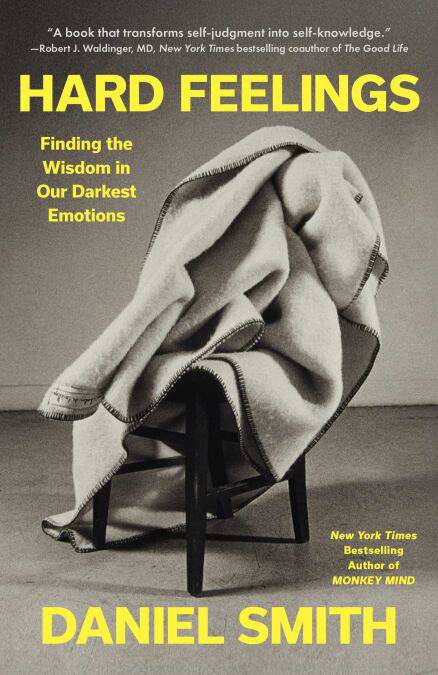
Bedankt voor het vertrouwen het afgelopen jaar! Om jou te bedanken bieden we GRATIS verzending (in België) aan op alles gedurende de hele maand januari.
- Afhalen na 1 uur in een winkel met voorraad
- In januari gratis thuislevering in België
- Ruim aanbod met 7 miljoen producten
Bedankt voor het vertrouwen het afgelopen jaar! Om jou te bedanken bieden we GRATIS verzending (in België) aan op alles gedurende de hele maand januari.
- Afhalen na 1 uur in een winkel met voorraad
- In januari gratis thuislevering in België
- Ruim aanbod met 7 miljoen producten
Zoeken
€ 16,76
+ 16 punten
Omschrijving
From a psychotherapist and the New York Times bestselling author of Monkey Mind, a thoughtful, deeply personal exploration of our most difficult emotions, arguing that they are not obstacles to overcome but essential messengers that can lead us toward wisdom and wholeness.
What if the emotions we fight hardest against—anger, shame, envy, regret, jealousy, annoyance, despair—are not enemies to be vanquished but essential guides to self-knowledge?
When two birthday gifts—a centuries-old treatise on melancholy and a book of Bosch’s hellscapes—arrived just months before the birth of Daniel Smith’s second child, he began questioning our culture’s dismissal of difficult feelings and his own lifelong struggle against these so-called “negative” emotions. Moving between intimate personal narrative and rich intellectual exploration, Smith investigates how our relationship with negative emotions has evolved through history—from the Seven Deadly Sins to modern psychology’s sometimes equally damning classifications. He explores what science, psychology, art, and philosophy can and cannot tell us about the nature of emotion itself, challenging conventional wisdom about what our feelings really are and how they function.
With unflinching honesty about his own emotional turbulence and the insights gained from his work as a psychotherapist, Smith makes a compelling case that our negative emotions serve crucial purposes—if only we would listen to what they’re trying to tell us. Whether examining the striking absence of anger among the Inuit or confronting his own emotional inheritance as a new father, Smith offers a perspective that is both deeply humane and surprisingly hopeful.
This book is not so much a guide to banishing difficult feelings, but rather an invitation to wholeness—to feeling everything—and discovering that even our darkest emotions contain intelligence, meaning, and the potential for profound transformation.
What if the emotions we fight hardest against—anger, shame, envy, regret, jealousy, annoyance, despair—are not enemies to be vanquished but essential guides to self-knowledge?
When two birthday gifts—a centuries-old treatise on melancholy and a book of Bosch’s hellscapes—arrived just months before the birth of Daniel Smith’s second child, he began questioning our culture’s dismissal of difficult feelings and his own lifelong struggle against these so-called “negative” emotions. Moving between intimate personal narrative and rich intellectual exploration, Smith investigates how our relationship with negative emotions has evolved through history—from the Seven Deadly Sins to modern psychology’s sometimes equally damning classifications. He explores what science, psychology, art, and philosophy can and cannot tell us about the nature of emotion itself, challenging conventional wisdom about what our feelings really are and how they function.
With unflinching honesty about his own emotional turbulence and the insights gained from his work as a psychotherapist, Smith makes a compelling case that our negative emotions serve crucial purposes—if only we would listen to what they’re trying to tell us. Whether examining the striking absence of anger among the Inuit or confronting his own emotional inheritance as a new father, Smith offers a perspective that is both deeply humane and surprisingly hopeful.
This book is not so much a guide to banishing difficult feelings, but rather an invitation to wholeness—to feeling everything—and discovering that even our darkest emotions contain intelligence, meaning, and the potential for profound transformation.
Specificaties
Betrokkenen
- Auteur(s):
- Uitgeverij:
Inhoud
- Aantal bladzijden:
- 256
- Taal:
- Engels
Eigenschappen
- Productcode (EAN):
- 9781982103927
- Verschijningsdatum:
- 2/03/2026
- Uitvoering:
- E-book
- Beveiligd met:
- Adobe DRM
- Formaat:
- ePub

Alleen bij Standaard Boekhandel
+ 16 punten op je klantenkaart van Standaard Boekhandel
Beoordelingen
We publiceren alleen reviews die voldoen aan de voorwaarden voor reviews. Bekijk onze voorwaarden voor reviews.









